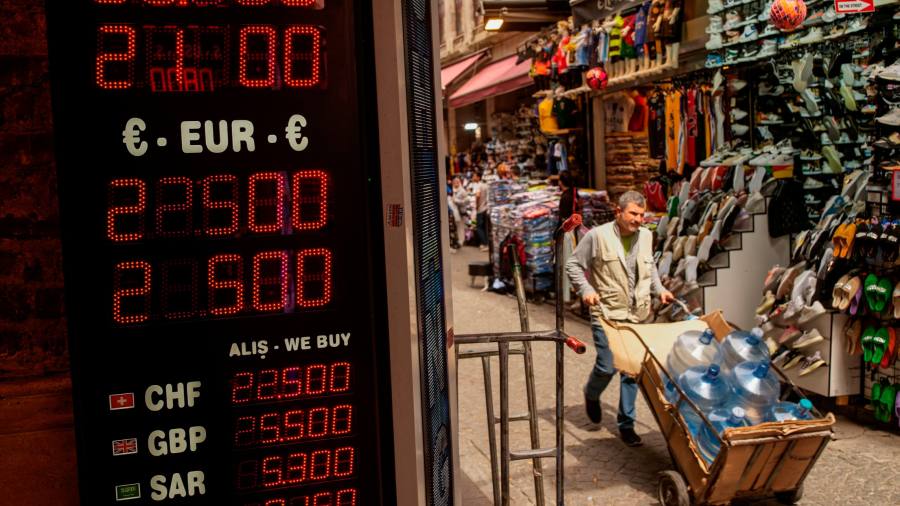The writer is chief investment officer of emerging market debt at FIM Partners
Debt and currency investors went into the Turkish elections pricing in a high chance of an opposition victory in the first round. Such victory was meant to bring about a return to economic orthodoxy even if it was understood that the macro challenges ahead were monumental and opposition unity was anything but guaranteed.
Five-year credit default swaps — a kind of insurance instrument to hedge against debt default — for Turkey had rallied, falling 70 basis points to 480bp going into the election last week. And investors had been buying the external bonds ahead of the event. Local currency bonds were pricing in large rate rises in anticipation of an opposition-controlled central bank that would be more responsive to inflationary challenges.
This is all gone now: those trades are being unwound with the CDS back up to 605bp and expectation of rate increases is reversing. Not only did the opposition not win outright, but the probability of President Recep Tayyip Erdoğan winning in the second round of elections has risen considerably with the ruling Justice and Development party (AKP) and its allies on track to secure a majority in the Turkish Assembly.
There will be a temptation to think that with Erdoğan more likely to retain control, markets will settle back to the status quo ante before the election.
That’s unlikely. For investors, what has kept Turkish risk in check over the past few years has partly been the combination of financial repression — or the government’s capture of domestic dollar savings and control over financial flows to keep the lira stable — and the selling of assets such as reserves.
And the expectation of a change in economic policy direction at some point down the road.
Whilst financial repression will continue under Erdoğan, the room to manoeuvre is getting narrower by the day, with each measure imposed by the government having a knock-on effect on different economic actors. A bank deposit scheme to provide an incentive to locals to keep their savings in lira, for example, is posing a large contingent liability to government finances when the lira depreciates against the dollar.
Likewise, the country’s and the central bank balance sheets have been run down to exceedingly low levels. Net foreign exchange reserves by the bank are running at levels insufficient to cover the large foreign exchange refinancing needs of the country.
Admittedly, economists and market participants have been pointing out the unsustainability of the Turkish economic model for years, but the damage to the balance sheet has never been as deep as it is today. In other words, initial conditions have never been as weak relative to previous crises.
The extent of internal and external imbalances is extreme, with both inflation and external deficits running at very elevated levels. The current account deficit is running at $54bn on a 12-month trailing basis as per the last date point in March, close to the all-time highs over the past decade. Meanwhile, inflation, while decelerating somewhat, is still more than 40 per cent year on year.
Political change was meant to be the conduit for a turn in economic policy direction. Absent that, this will now have to come from within the AKP itself. It is not impossible. Erdoğan could have an ideological epiphany on the economy. Or maybe, with a more comfortable majority in power, he could come to the more prosaic realisation that the only way out from the current economic predicaments is orthodoxy.
There have been market friendly appointments to key economic posts in the past but those have been shortlived or overpowered by the power of the presidency.
Turkey has had strong financial backers of late, mostly from the Gulf — Saudi Arabia, for example, deposited $5bn into the Turkish central bank in March as the country was dealing with the aftermath of a massive earthquake in February. But even Gulf creditors are becoming more credit sensitive and more attuned to the difficult economic realities globally and on the ground.
The reality is that the history of economic management under the AKP has been one of growth at all costs, no matter the imbalances, with a sharp focus on the next election.
What this means in practical terms is that the country will continue to walk on the edge of the precipice, if only one or two steps closer now. Markets will have to reprice accordingly, taking a dimmer view on Turkish credit, and incorporating a higher probability of a financial accident.
Read the full article here




